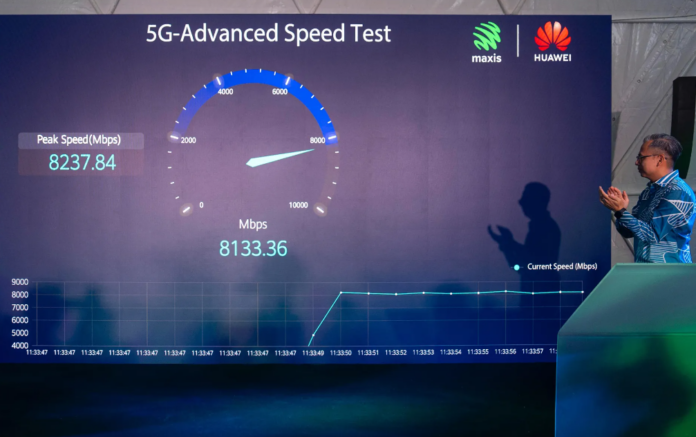Maxis said the trial featured interactive applications of 5G-Advanced, including low latency live streamings, live 3D content and immersive AR experiences
Malaysian carrier Maxis and Chinese vendor Huawei said they have successfully showcased what it claims to be the the first 5G-Advanced technology trial in Malaysia and Southeast Asia.
In a release, the Asian operator said the 5G-Advanced trial included a live speed test to demo 5G-Advanced’s capabilities to achieve ultra-fast peak speeds of up to 8Gbps.
5G-Advanced, also known as ‘5.5G’, promises up to 10 times improvement in speed, connected devices and latency compared to current 5G networks, Maxis said.
The demonstration booths featured interactive applications of the technology, including low latency live streaming of various Kuala Lumpur city center views, live 3D content and immersive augmented reality (AR) experiences.
“This ‘5.5G’ trial demonstrates the potential of Malaysia’s telecommunications sector in contributing meaningfully to advancing our communications connectivity. We hope more industry players will pioneer innovative technologies that will help Malaysian enterprises move up the value chain through next-generation commercial and industrial solutions,” said Tan Sri Mohamad Salim bin Fateh Din, chairman of the Malaysian Communications and Multimedia Commission (MCMC).
“Huawei has been working on R&D and verification of key ‘5.5G’ technologies and business cases. Today, we bring the latest ‘5.5G’ technology and launch the first ‘5.5G’ showcase in Malaysia. This will show the world that Malaysia leads the region in digital infrastructure, proving its enabling environment and digital facilities are one of the best to attract and retain foreign investments,” said Simon Sun, CEO of Huawei Technologies Malaysia.
Maxis also highlighted that ‘5.5G’’s advanced capabilities can support digitalization, automation, and the internet of things (IoT) across many sectors. These capabilities will facilitate the digital upgrade of core industries such as high-end manufacturing, automotive and smart transportation, as well as enable state-of-the-art visual communication through 3D and extended reality (XR). In addition, 5G-Advanced will support the development of affordable IoT solutions, the carrier added.
Almost 10.07 million people in Malaysia have subscribed for 5G services, marking an adoption rate of 29.9% as of the end of January, the country’s communications minister Fahmi Fadzil said following the ‘5.5G’ showcase.
The Malaysian government had previously stated that Malaysia would shift to a dual 5G network once DNB achieved 80% coverage in populated areas, a goal that was achieved by the end of last year.
The government recently confirmed that the special committee overseeing the implementation of the country’s 5G network was working to prepare a Cabinet memorandum soon to discuss and decide whether it is time to allow a second 5G network.

